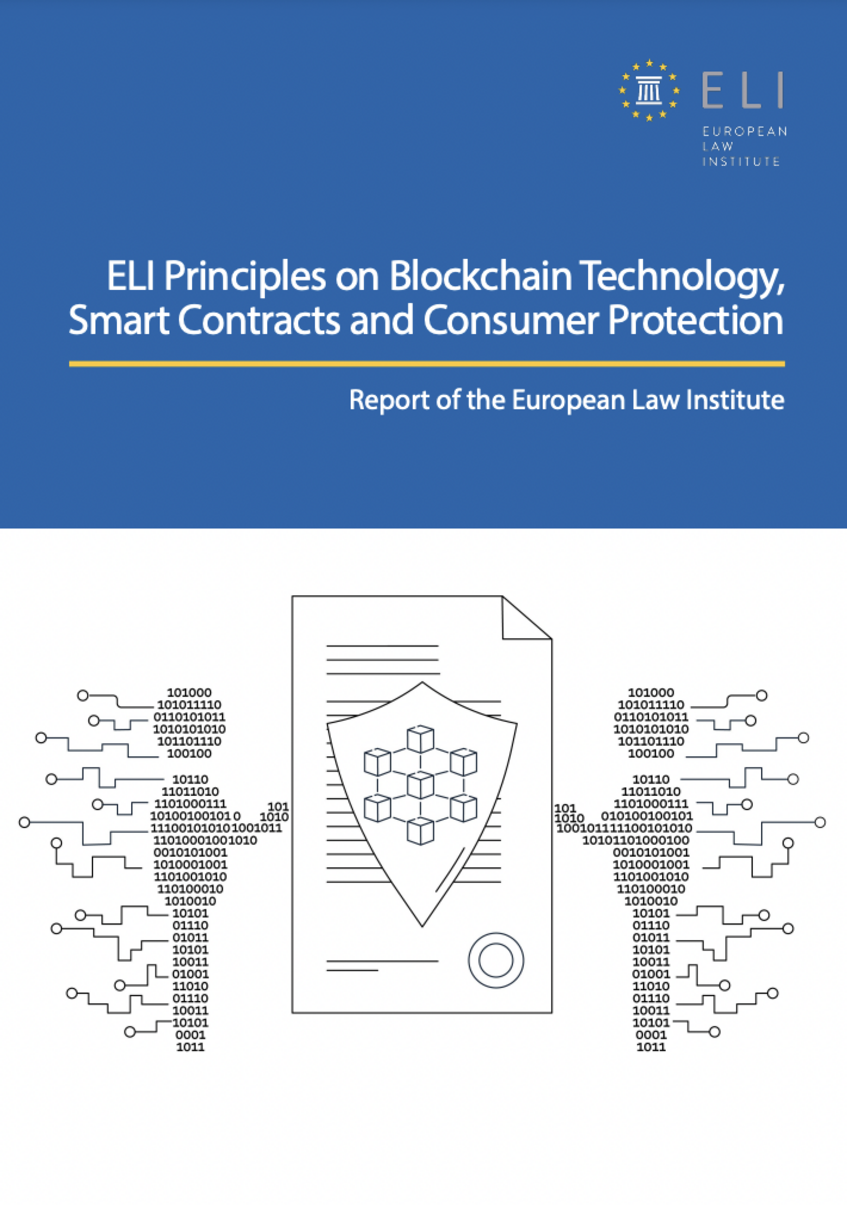ELI Principles on Blockchain Technology, Smart Contracts and Consumer Protection
Quick Facts
Project Type: Principles
Procedure: Regular
Adopted: CD 2018/9
Project Period: September 2018–June 2022
Other Events
An overview of past and upcoming events of this project is available here.
Summary
Both technologies (Blockchains and Smart Contracts) are profoundly changing many areas of private law transactions. Whether the current system of private law can readily cope with these novel forms of ‘self-executing’ agreements, or whether new solutions are required, are fundamental questions.
Background
Both technologies (Blockchains and Smart Contracts) are profoundly changing many areas of private law transactions. Whether the current system of private law can readily cope with these novel forms of ‘self-executing’ agreements, or whether new solutions are required, are fundamental questions.
Distributed Ledger Technology (DLT, of which blockchain is an example) and smart contracts are technologies that have a huge potential to fundamentally change many areas of private law transactions. Ambiguities in this field, however, are slowing down the use of such technologies as most commercial parties in the blockchain field (from startups to banks) do not wish to risk non-compliance with applicable laws in this borderless field. The ELI Principles plug lacunae of legal uncertainty on the legal nature, status and consequences of using blockchains and smart contracts.
Whereas a blockchain is data, essentially, stored in blocks and organised in an append-only sequential chain, a smart contract is a computer programme that, upon the occurrence of pre-defined conditions, runs automatically and executes pre-defined actions according to the terms of a contract or an agreement. By one account, the global smart contracts market size is projected to reach EUR 1,5 billion by 2028, from EUR 308 million in 2021.
Clarification is also needed as to the rights of consumers when a transaction is concluded by using a blockchain or a smart contract. European Union law already strengthens the position of consumers, as they lack both bargaining power as well as knowledge and expertise in their dealings with businesses. For consumers the functioning of blockchains and smart contracts is like a black box, which makes their position even more precarious. The Principles, therefore, also aim to spell out how consumer protection, as developed for more traditional transactions functions in a coded environment, thus also making clear to businesses how consumer rights function when they use blockchains and smart contracts.
A Use-Case-Approach (ie a descriptive and up-close exploratory examination of how a blockchain could function in a real-world context) was adopted at the commencement of the project to comprehend how blockchains and smart contracts might be used in practice. However, rapid developments led the team to focus more on the legal aspects of blockchains and smart contracts, both in a commercial and, at the European Commission’s suggestion, consumer settings and to develop corresponding theories, which should ultimately result in Principles. Before theories were formulated as Principles they were tested against known use-cases to ensure their practicability.
Aim
The Principles elaborated by the Team follow an approach which is aimed at being both functionally equivalent to existing law and technologically neutral. To deal with the existing legal divergence in and outside Europe, the Principles are drafted in functionalist terms, avoiding jurisdiction-specific terminology as much as possible. Also, the Principles are formulated quite generally and in such terms that, in light of rapid technological advances, both the risks of under- and overinclusion are avoided.
ELI’s Principles on Blockchain Technology, Smart Contracts and Consumer Protection will support legislators in drafting sets of specific rules that are more appropriate to contracts in this field whenever such a derogation from traditional contract law is fitting. They will also help judges in their roles as interpreters of the resulting legislation.
Project Reporters
- Sjef van Erp
- Martin Hanzl
- Juliette Sénéchal (until January 2021)
Project Team Members
- Adrien Basdevant
- Raffaele Battaglini
- Vincent Danos
- Primavera de Filippi
- Michele Marchesi
- William McKechnie
- Denis Philippe
- Pascal Pichonnaz
- Ernst Steigenga
- Teresa Touriñán
- Jos Uitdehaag
- Jasper Verstappen
- Aura Esther Vilalta Nicuesa
- Jacques Vos
- Aneta Wiewiórowska-Domagalska
- Christopher Wray
- Filippo Zatti
- Fryderyk Zoll
Advisory Committee Members
- Christoph Busch (Assessor)
- Teresa Rodríguez de las Heras Ballell (Assessor)
- Hans Schulte-Nölke
- Pietro Sirena (Assessor)
- Célia Zolynski
- Christiane Wendehorst
Members Consultative Committee
- Despoina Anagnostopoulou
- Arvind Babajee
- Anurag Bana
- Małgorzata Boszko
- Daniele Busani
- Pınar Çağlayan Aksoy
- Ana Cediel
- Claudio Cipollini
- Moustapha Ebaid
- Marco Giacalone
- Francisco Javier Jiménez Muñoz
- Marina Kasatkina
- Matthias Lehmann
- Antonio Legerén Molina
- Francesco Longobucco
- Elena Alina Ontanu
- Vadims Mantrovs
- Kiril Mitrov
- Alberto Monti
- Sophie Moreil
- Dimitrios Moustakatos
- Albert Ruda (Chairperson)
- Leigh Sagar (Deputy Chairperson)
- Roberto Sammarchi
- María Elena Sánchez Jordan
- Vijay Kumar Singh
- Alina Škiljić
- Dejan Ukropina
- American Constitution Society (represented by Timothy Burns)
- Austrian Chamber of Civil Law Notaries (represented by Stephan Matyk-d’Anjony)
- Centre for Legal and Economic Research (represented by Maria Raquel Guimarães)
- Blockchain Education Network Italia (represented by Niccolò Travia)
- Curia of Hungary (represented by László Czibulka)
- European Law Students Association (ELSA Austria, represtented by Arsen Hovakimyan)
- European Union of Judges in Commercial Matters (UEMC, represented by Rainer Sedelmayer)
- Faculty of Law of Izmir University of Economics (represented by Huriye Kubilaj)
- University "Vasile Goldis" Arad-Romania (represented by Christian Alunaru†)
- University of Latvia (represented by Janis Karklins)
Observer
- Hungarian Chamber of Civil Law Notaries (represented by Tamás Parti and Tamás Sajben)

